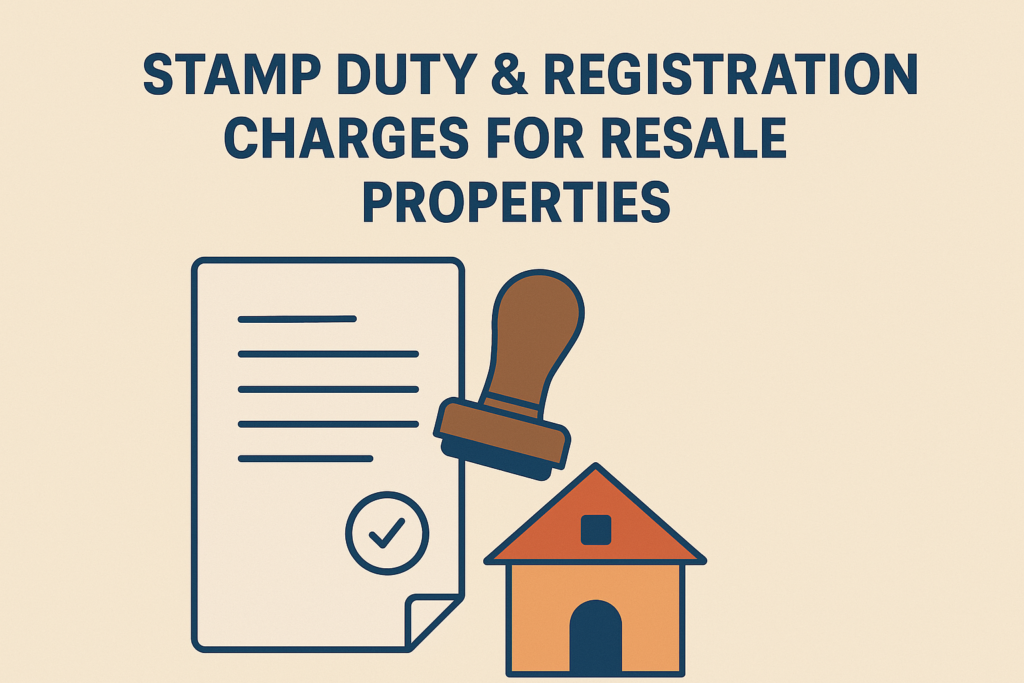
Buying a resale property is an exciting milestone. However, before you pop the champagne, there’s one thing you can’t overlook — the stamp duty and registration charges for resale Properties. These charges can significantly impact your total investment, so understanding them is crucial.
In this blog, we’ll break down what stamp duty and registration charges are, how they are calculated, and what buyers need to keep in mind while purchasing a resale property in India.
✅ What is Stamp Duty?
Let’s start with the basics.
Stamp duty is a type of tax you pay to the state government when you purchase a property. It serves as legal proof of property ownership and must be paid to get the property registered in your name.
Different states in India have different stamp duty rates, which typically range from 3% to 7% of the property’s market value or sale price — whichever is higher.
Why Does Stamp Duty Matter for Resale Properties?
Many buyers assume stamp duty only applies to newly constructed homes. However, that’s a common misconception. Stamp duty is applicable even when buying a resale property, and the rate is the same as it is for a new one.
📝 What are Registration Charges?
In addition to stamp duty, you also need to pay registration charges. This fee is for registering the property in your name with the local sub-registrar’s office. It legally records the transaction between the buyer and the seller.
Generally, registration charges are 1% of the property’s value, though again, this can vary slightly by state.
📍 Example: How Much Is Stamp Duty and Registration charges on a Resale Properties in Maharashtra?
To help you understand better, here’s an example of how these charges work in Maharashtra — one of the most active real estate markets in India.
- Stamp Duty in Maharashtra (for resale properties):
- Mumbai: 5%
- Pune, Thane, and other cities: 6%
- Registration Charges: 1%
So, if you’re buying a resale flat in Pune for ₹50 lakhs:
- Stamp Duty = ₹3,00,000 (6% of ₹50L)
- Registration Charges = ₹50,000 (1% of ₹50L)
Total Charges = ₹3,50,000
💡 Key Factors Affecting Resale Property Stamp Duty Rates
You may be wondering, why does the rate vary so much? Well, stamp duty is influenced by several factors:
- Location of the property (urban vs rural areas)
- Type of buyer (women, senior citizens, etc., often get a concession)
- Type of property (residential vs commercial)
- Property’s age (older properties may attract slightly different rates in some states)
🛑 Things to Keep in Mind Before Making a Payment
Now that you know the basics, here are a few quick tips to avoid surprises:
- Always check the latest rates in your state, as they are subject to change.
- Ensure the payment is made in full before or at the time of registration.
- Keep all receipts and documents safely stored for future use, such as resale or legal verification.
💭 Final Thoughts on Stamp Duty and Registration Charges for Resale Properties
While stamp duty and registration charges might feel like additional burdens, they are essential for safeguarding your ownership rights. Skipping or underreporting them could lead to legal hassles down the line — and nobody wants that.
So, the next time you’re buying a resale property, plan ahead, factor in these charges, and move forward with confidence.

Join The Discussion